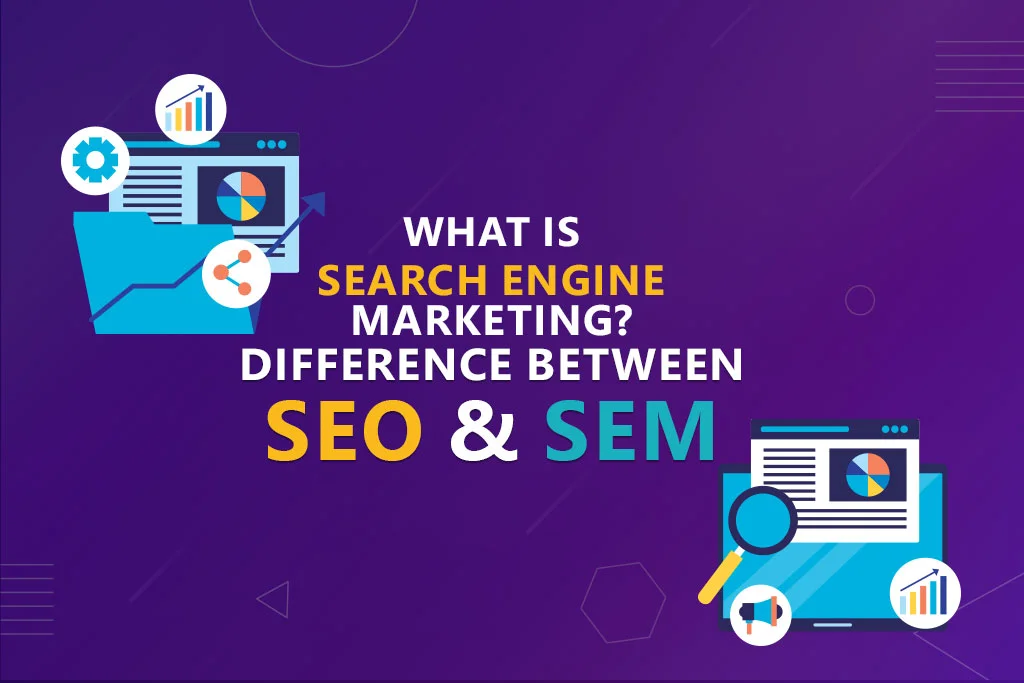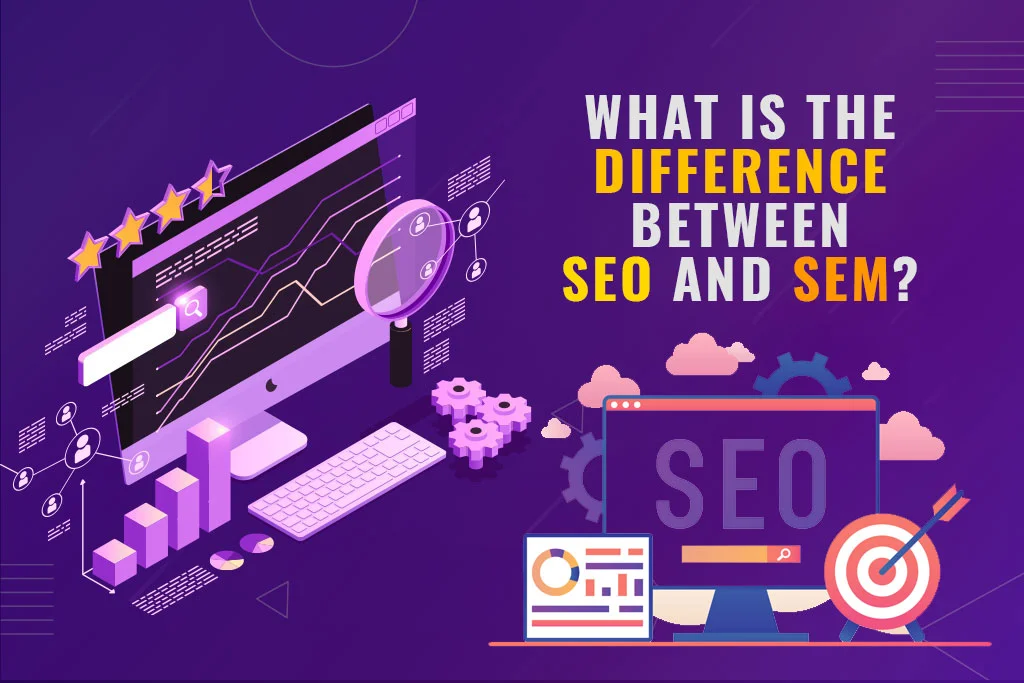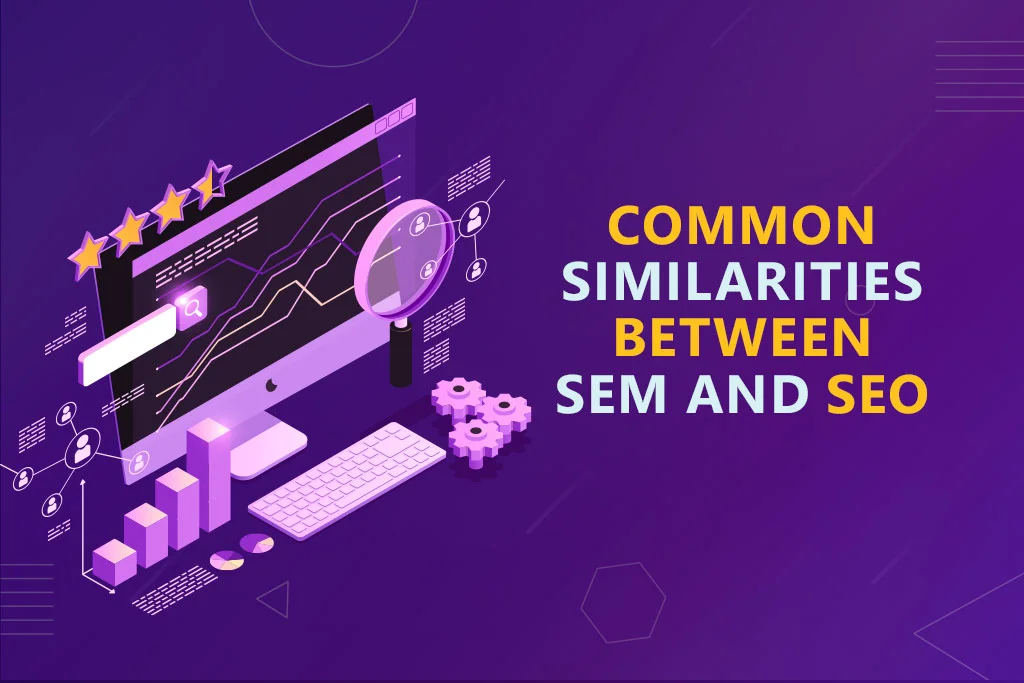What is Search Engine Marketing? Difference Between SEO & SEM

Are you confused about the services of SEO & SEM? There is no need to be confused about these services. We have got you covered. Here, you can clear all of your confusion. Many people search the internet daily. It forced marketers to utilize SEO and SEM strategies to increase their site’s visibility on search engines. Search engine optimization and search engine marketing techniques both offer companies ways to increase sales. But, for this purpose, they use different approaches.
SEO techniques can help organizations boost their organic search ranking. On the other side, Search Engine Marketing techniques pay advertisements to quickly increase site traffic. They should understand the differences between SEO and SEM to make sure that the marketing teams focus on the right strategy for their business needs. Like, they notice the search results they target, the time they take to bear results, and their short- and long-term costs.
What Is Search Engine Marketing (SEM)?
SEM is also known as Search engine marketing. It boosts website visibility through paid advertising on search engine results pages. It’s also called paid search or pay-per-click. SEM places ads based on specific keywords related to the offering. It affects reaching new customers, driving traffic, and generating leads. Search Engine Marketing Agency may vary with some focusing simply on paid marketing, while others include organic strategies.
SEM operates on several different tactics, including:
Account structure:
Suppose your account structure moves from account to advertiser to ad group to ad. Then, it assists your company in organizing its ad strategy and optimizing its marketing expenditure. For example, Ads for women’s clothes should be placed within the same ad cycle.
Bids:
Your bid specifies how much your company will pay for a click on your ad. Some platforms, such as Google Ads, have automated bidding alternatives. They assist your company in achieving its specific goals while remaining within your ad budget.
Quality Score:
Your Quality Score is a Google Ads-specific metric, which measures the quality and relevance of your ad. A high-quality Score leads to lower cost-per-click and better ad placements.
Ad assets:
Your ad materials include your writing, graphics, and video. When you optimize your ad assets, you boost your company’s chances of providing relevant advertising and increasing your click-through rate.
Why is SEM important?

With more people shopping online, search engine marketing (SEM) is essential for businesses to reach their customers. The majority of website visitors find sites through search engines. Search Engine Marketing allows advertisers to pay only when someone clicks on their ad, making it a cost-effective option. Also, each click increases the website’s search engine rating. When consumers search, they are ready to buy, as compared to social media where they are not actively looking. SEM targets customers when they are open to new information, rather than affecting them like traditional ads. SEM produces speedy results, making it one of the most efficient strategies to increase website traffic.
How Does Search Engine Marketing Work?
Search engines utilise complex algorithms to provide suitable results depending on location and other criteria. Paid search ads are displayed at the top and side of search results pages for increased visibility. When people search for items or services, relevant ads based on their keywords appear clearly. Marketers launch Search Engine Marketing campaigns by researching keywords. They select geographic locations, generate text-based advertising, and bid on click pricing. Content-only ads are straightforward to build. They include a headline, body content, call-to-action, and URL. Search Engine Marketing is often recognized as a highly effective approach to distributing marketing resources.
How Long Does Search Engine Marketing Take?
Search engine marketing (SEM) is a time-consuming activity. Depending on the size of your company, the complexity of optimizing your website, and your SEM ad targets, the process might take anywhere from a few weeks to several months. However, once the initiative is up and running, it is relatively simple to operate and requires little finishing maintenance.
What Is Search Engine Optimization?
SEO also known as Search engine optimization helps websites rank higher in Google and other search engines. It involves optimizing web content. It appears more prominently in organic search results. This includes web pages, videos, images, and local listings. Since most people find online content through search engines. Using Search Engine Optimization is crucial for increasing website traffic.
SEO includes a wide range of operations to improve search engine optimization on your website and otherwise on the internet. These activities are often divided into three categories.
On-page SEO:
On-page SEO refers to optimization efforts. It takes place on your website, such as changing the title tag, posting a new blog post, or increasing page speed. You have complete control over on-page SEO.
Off-page SEO:
Off-page SEO refers to optimization actions. It takes place outside of your website, such as outreach, optimizing social media profiles, and distributing information. You have some control over off-page SEO, but not much.
Technical SEO:
Technical SEO is the process of optimizing your website. So that Google and other search engines can access and index it. It can involve things like increasing page speed or creating internal links.
What Is The Difference Between SEO And SEM?

SEO and SEM perform many services. But mostly, both of these services are different from each other. So that SEO and SEM work in their way. Here are the many differences between SEO and SEM, which are explained below:
| No. | SEO | SEM |
|---|---|---|
| 1 | The CTR of SEO is higher than SEM. | The CTR of SEM is lower than SEO. |
| 2 | Search Engine Optimization improves the visibility of the website. | Search Engine Marketing improves the sales of small businesses. |
| 3 | The Search Engine Optimization search result doesn’t target any audience. | The Search Engine Marketing Company’s search result targets the selected audience. |
| 4 | SEO strategies can help firms to boost their organic search ranking. | SEM strategies paid advertisements to quickly increase site traffic. |
| 5 | SEO best practices can help marketers. It creates effective landing pages for their SEM campaigns. | New sites can use SEM campaigns to generate traffic. It can help them gain backlinks and improve SEO. |
| 6 | Organizations with a limited marketing budget may want to focus strictly on SEO until their budget increases. | Marketing teams need quick results or lack the resources. They create optimized content that may focus on SEM. |
| 7 | Search Engine Optimization is a long-term strategy. | SEM is all about paid ads. So, after you stop paying, your website's ranking will stop. |
| 8 | The benefits of SEO are increased traffic, ROI, and cost-effectiveness, increased site usability, and brand awareness. | The benefits of SEM are geotargeting, control, pay-per-action, and free exposure. |
Common Similarities Between SEM and SEO:

Other than their differences, Search Engine Optimization and Search Engine Marketing share the following similarities:
Keyword Research:
SEO and SEM both rely on extensive keyword research to identify words and phrases. It is used by potential buyers when looking for items or services. This study is critical for optimizing websites and developing effective ad campaigns that match user search preferences.
Brand Visibility:
SEO and SEM both play important roles in improving the visibility of brands. SEO achieves this by gaining high organic search positions, whereas SEM does so through paid advertisements. The result is a broader reach to a larger audience, which raises brand awareness.
User Experience:
Providing a great user experience is critical in both Search Engine Optimization and SEM efforts. This involves producing material that is not only search engine optimized, but also user-friendly, useful, and timely. Search Engine Marketing extends to providing potential customers with seamless and valuable experiences.S
Data Analysis and Insights:
Search Engine Optimization and Search Engine Marketing are excellent sources of important data. Businesses can acquire valuable insights into the efficiency of their marketing activities by regularly monitoring data like website traffic, keyword performance, and conversion rates. These insights allow marketers to optimize campaigns and get higher results.
Cross-Platform Campaigns:
Search Engine Optimization and Search Engine Marketing are flexible and can be used in cross-platform marketing efforts. This means that firms can use the same keywords and targeting data across many channels. It includes search, social media, and display ads. This cross-channel approach not only broadens the audience reach. It also ensures a more cohesive and effective marketing plan in general.
What Is The Cost Of SEO and SEM?
Search Engine Optimization and Search Engine Marketing expenses can differ significantly. Although Search Engine Optimization may look free. It often involves spending money on tools, outreach, content, and optimization. Costs vary depending on the size, goals, and level of competition of the business. Although budgets differ, SEO services can often cost $500 per month.
SEM includes all SEO expenses plus creating and managing PPC ads. Search engine marketing costs typically range from $3,000 to $10,000 each month. Although organic strategies could initially be more cost-effective. But, paid efforts produce quicker results. It is essential for companies looking to expand quickly.
Conclusion:
SEO and SEM are critical for increasing your website’s access and getting targeted traffic. Combining these strategies allows you to maximize your return on investment. It also reaches out to new market prospects. SEO prioritizes long-term growth by optimizing your website to appear higher in search results. Search Engine Optimization Firm provides quick results through paid advertising.
To stay effective, both tactics have to adjust to the changing digital reality. Businesses have to include SEO in their marketing strategies to support SEM efforts and maintain long-term growth. Businesses may remain relevant and competitive in the ever-changing Internet market by adapting and optimizing continuously. For SEO and SEM services, you can easily rely on MediaEclips which is the best digital marketing agency in Plano, Texas. Make a consultation call whenever you want to clear your doubts and services.
FAQs:
Search Engine Marketing uses paid advertising to boost website visibility in search engine results. Search Engine Optimization focuses on optimising website content so that it ranks naturally without paid promotion.
Common myths about Search Engine Optimization and Search Engine Marketing include the belief that they create fast results. That results in huge funds being required for success. They are unique methods rather than complementary approaches to digital marketing.
Neither Search Engine Optimization nor Search Engine Marketing is smart. They serve different purposes. SEO focuses on organic search results and long-term visibility, whereas SEM employs paid advertising to achieve rapid visibility. The decision is based on your objectives, money, and timetable.

